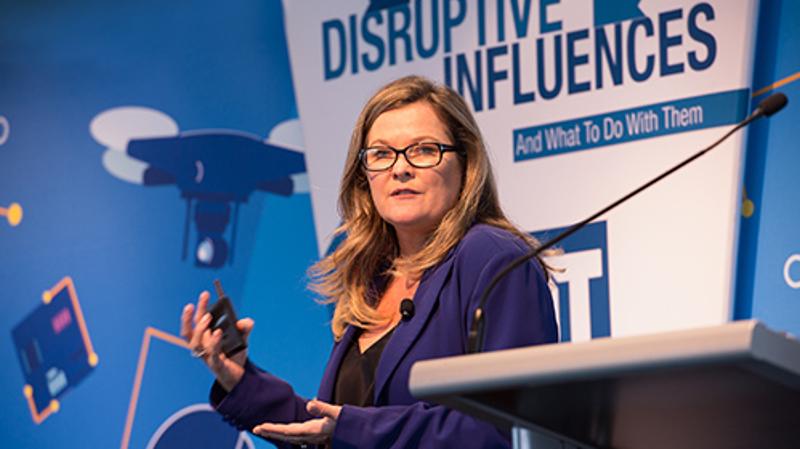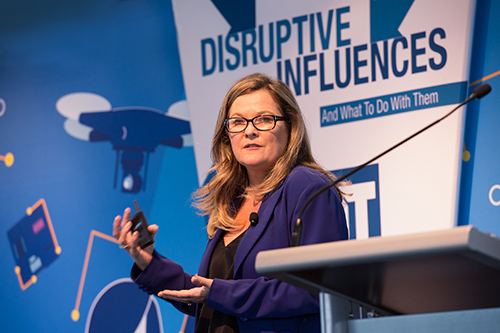
“You need a little bit of crazy in a founder,” so said Suncorp CEO of Strategic Innovation Pip Marlow to a packed room at the QUT’s Disruptive Influences and What to Do with Them conference today.
- Sometimes to innovate you have to kill the business that you have
- The greatest barrier to innovation is culture
- Customers’ needs remain the same, but ways to fulfil those needs are constantly disrupted
- Start-ups don’t defend current business models but attack them, makes it hard for incumbents
- No industry is immune to disruption

Ms Marlow said the Airbnb founders were thought to be crazy when their new business model was people staying in strangers’ spare bedrooms.
“Airbnb didn’t get it right first time … but you’ve got to be able to dream big.”
She said a key principle of innovation was to constantly ask “what business am I really in, what does my customer really want and how can I think about that differently?” and to anticipate their future needs as disruptions occur.
“For example, the need to get from Place A to B is the need for mobility.”
She cited two potential mobility disrupters - autonomous vehicles and car sharing.
“Insurers, whose business is predicated on people owning their own cars, should be thinking through the many options and ways to support their customers in the face of these upcoming disruptions.
“You still need to get from A to B but chances are you will not own your own car and you will not be driving that vehicle.
“A car is our second most expensive asset and it sits unused 90 per cent of the time. It has latent capacity. Maybe customers will share their cars and someone else will drive it in the Uber world so they can monetise that asset.”
Ms Marlow said neither technology nor dollars held back innovation.
“The greatest barrier is culture – ‘incumbents’ disease’. Organisations more mature in their life cycle have to make innovation part of their DNA and build an innovation ecosystem.
“We must believe there is a better way; constantly scan our customers and the competitive landscape to understand how to deliver it; embrace lifelong learning and must be able to fail – fast, frequently and frugally.”
She detailed how Amazon’s market value had increased by a staggering 1,934 per cent in 10 years from 2006 while iconic bricks and mortar retailers like Nordstrom and Sears had rested on their laurels and seen their value plummet.
“These companies have been ‘Amazoned’ in many ways,” she said.
“Customers, however, still have the same needs. What has changed is how technology and a business model was created to help fulfil that need in a far more effective way.
“Amazon gives customers time back, its algorithms show what other people have bought to open up more opportunities (to choose from), and then deliver, often later that day.”
Ms Marlow said no industry was immune to disruption.
“I see disruption very clearly in the financial services. Partly it comes through technology bitcoin, block chain, the use of APIs, and AI. And partly from start-ups that are not constrained by history and processes.”
Ms Marlow detailed how Netflix had repeatedly killed its business by innovating to meet customer needs.
“Netflix disrupted Blockbuster by letting people order movies and sending them the DVDs, which saved time and late fees to video stores. They then disrupted their own business model and killed the DVD business to use the internet to stream.
“Now, they are making movies available for download to be watched offline because people are not always on line.”
Media contact: Niki Widdowson, QUT Media, 07 3138 2999 or n.widdowson@qut.edu.au
After hours: Rose Trapnell, 0407 585 901 or media@qut.edu.au.




